
Journal of Genetic Counseling
Scope & Guideline
Advancing the frontiers of genetic counseling.
Introduction
Aims and Scopes
- Patient-Centered Care:
The journal emphasizes research that prioritizes the needs, experiences, and perspectives of patients undergoing genetic counseling. This includes studies on emotional support, communication strategies, and the impact of counseling on patient empowerment. - Diversity and Inclusion:
There is a consistent focus on examining and promoting diversity within genetic counseling, including the experiences of racial and ethnic minorities, LGBTQIA+ individuals, and other underrepresented groups in the field. - Clinical Practice and Guidelines:
The journal publishes findings related to clinical practices, including the development of practice resources and guidelines for genetic counselors. This includes risk assessment, communication of genetic test results, and management of genetic conditions. - Education and Training:
Research on the education and training of genetic counselors is central to the journal, covering topics such as curriculum development, competencies, and innovative training methods to enhance the skills of future genetic counselors. - Technological Integration:
The journal explores the role of technology in genetic counseling, including telehealth, digital tools, and the impact of direct-to-consumer genetic testing on counseling practices.
Trending and Emerging
- Telehealth and Remote Counseling:
The COVID-19 pandemic has accelerated the adoption of telehealth in genetic counseling, leading to a surge in research focused on remote counseling practices, patient experiences, and the effectiveness of virtual consultations. - Cultural Competency and Inclusivity:
Emerging themes include a strong focus on cultural competency in genetic counseling, addressing the unique needs of diverse populations, and developing resources to support inclusivity in counseling practices. - Impact of Direct-to-Consumer Genetic Testing:
As more individuals access genetic testing through direct-to-consumer platforms, research is increasingly examining the implications of this trend for genetic counseling practices, including how counselors can effectively integrate these results into patient care. - Mental Health and Psychological Support:
There is a growing emphasis on the psychological aspects of genetic counseling, particularly regarding the emotional impact of genetic testing and the need for mental health support for patients navigating genetic risks. - Interdisciplinary Approaches:
Emerging research highlights the importance of interdisciplinary collaboration in genetic counseling, involving partnerships with other healthcare professionals to enhance patient care and address complex medical and psychosocial issues.
Declining or Waning
- Traditional Genetic Testing Models:
As direct-to-consumer genetic testing becomes more prevalent, there is a noticeable decline in research focused on traditional genetic testing models, which may be viewed as less relevant in the current context. - Generalized Genetic Counseling Approaches:
Research on generalized or one-size-fits-all genetic counseling approaches is decreasing, as the field increasingly values tailored and personalized counseling strategies that consider individual patient needs and backgrounds. - Focus on Rare Conditions:
There appears to be a waning interest in genetic counseling research specifically focused on rare genetic conditions, as the field shifts toward broader applications of genetic counseling across more common hereditary diseases and conditions. - Ethical Discussions on Genetic Testing:
While ethical considerations remain important, there has been a decline in the volume of published research specifically addressing ethical dilemmas in genetic testing, perhaps due to a saturation of the topic in earlier years.
Similar Journals

JOURNAL OF MEDICAL GENETICS
Shaping the Future of Medical Genetics with Quality Research.JOURNAL OF MEDICAL GENETICS, published by the BMJ PUBLISHING GROUP, stands as a premier platform in the field of genetics, focusing on both fundamental genetic research and its clinical applications. With a distinctive legacy dating back to 1965 and a significant role in advancing the understanding of genetic disorders, this journal has established itself in the top tiers with a commendable Q1 category ranking in both Genetics and Clinical Genetics as of 2023. The journal's impact is underscored by its Scopus rankings, placing it among the leading journals in the fields of medicine and genetics. Researchers and practitioners are drawn to its rigorous peer-review process and its commitment to disseminating high-quality research findings, critical reviews, and innovative clinical practices. While it is not an open-access journal, the insights provided are invaluable for anyone looking to deepen their knowledge or contribute to the burgeoning field of medical genetics.
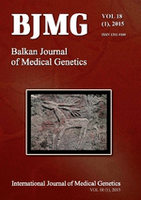
Balkan Journal of Medical Genetics
Pioneering research that connects genetics with patient care.Balkan Journal of Medical Genetics is an esteemed scientific publication dedicated to advancing research in the field of medical genetics. Established in 2000 and published by SCIENDO, the journal has embraced an Open Access model since 2007, ensuring that vital findings are readily accessible to researchers, healthcare professionals, and students worldwide. With an ISSN of 1311-0160 and an E-ISSN of 2199-5761, this journal serves as a platform for innovative studies and clinical findings, although it currently ranks in the lower quartiles within its categories according to the 2023 Scopus rankings. The journal's geographical roots in Macedonia reflect the region's commitment to contributing to the global understanding of genetics. By publishing high-quality research, the Balkan Journal of Medical Genetics aims to foster collaboration and knowledge exchange among scientists and healthcare providers, ultimately enhancing patient care and genetic research practices.

Journal of Pastoral Care & Counseling
Inspiring Multidisciplinary Collaboration for Holistic CareJournal of Pastoral Care & Counseling, published by SAGE Publications Inc, serves as a pivotal platform for scholarly discourse within the realms of pastoral care, counseling, and religious studies. With a distinguished Q1 ranking in Religious Studies for 2023 and a notable Scopus ranking of #37 out of 644 in the field of Arts and Humanities, this journal has established itself as a leading source for innovative research and practical insights. Although it operates on a traditional subscription model, the journal ensures a wide dissemination of its content, enriching the academic landscape since its inception in 2002. The journal seeks to foster multidisciplinary collaboration and elevate the standards of practice within pastoral care and counseling, making it essential reading for researchers, professionals, and students keen on exploring the intersection of spirituality and mental health.
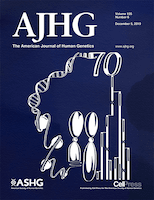
AMERICAN JOURNAL OF HUMAN GENETICS
Illuminating the Path of Genetic InnovationThe American Journal of Human Genetics, published by Cell Press, stands at the forefront of the genetics field, serving as an invaluable resource for researchers, clinicians, and students alike. With ISSN 0002-9297 and E-ISSN 1537-6605, this esteemed journal has been a cornerstone of genetic research since its inception in 1950 and continues to shape the landscape of human genetics as it evolves through 2024. Recognized for its exceptional quality, it holds a prestigious Q1 ranking in both genetics and clinical genetics, highlighting its significance and impact in the scientific community. With Scopus rankings placing it 5th out of 99 in clinical genetics and 20th out of 347 in biochemistry, genetics, and molecular biology, the journal attracts cutting-edge research and groundbreaking discoveries. While the journal maintains a subscription-only model for access, its contributions are critical in advancing our understanding of human genetics, making it a must-read for those dedicated to pushing the boundaries of knowledge in this dynamic field.
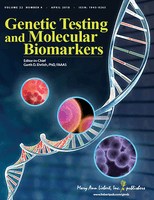
Genetic Testing and Molecular Biomarkers
Unlocking Insights at the Intersection of Genetics and Medicine.Genetic Testing and Molecular Biomarkers, an esteemed journal published by MARY ANN LIEBERT, INC, serves as a pivotal platform for advancing the field of genetic research and its applications in medicine. Focused on the innovative intersections of genetics and biomarker discovery, this journal has consistently contributed meaningful insights since its inception in 2009, with its scope evolving through 2024. With an ISSN of 1945-0265 and an E-ISSN of 1945-0257, it offers both traditional and open access options to cater to a broad audience of researchers, professionals, and students. Despite its current classification in the Q4 and Q3 quartiles for Genetics (clinical) and Medicine (miscellaneous) respectively, the journal remains committed to publishing high-quality, peer-reviewed articles that push the boundaries of knowledge in the field. As the landscape of genomic medicine continues to expand, Genetic Testing and Molecular Biomarkers is positioned as a crucial resource for disseminating cutting-edge discoveries and fostering interdisciplinary collaboration.
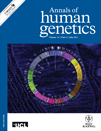
ANNALS OF HUMAN GENETICS
Exploring the Depths of Genetic InsightsANNALS OF HUMAN GENETICS is a distinguished peer-reviewed journal extensively covering the field of genetics, published by Wiley. Established in 1954 and extending its influence into 2024, this journal features comprehensive research articles, reviews, and case studies aimed at advancing our understanding of human genetic conditions and their implications on health. With its ISSN number 0003-4800 and E-ISSN 1469-1809, the journal has carved a prominent niche within the academic community, currently ranking in the third quartile in both genetic and clinical genetics categories (Q3, 2023). Its Scopus rankings reflect its credibility, placing it #54 out of 99 in clinical genetics. Though it is not open access, it remains an essential resource for researchers and practitioners seeking to explore the latest findings and methodologies in genetics, serving as a critical platform for knowledge dissemination and dialogue within the scientific community. As we delve deeper into the complexities of our genetic makeup, the ANNALS OF HUMAN GENETICS continues to play a vital role in fostering innovation and collaboration in this ever-evolving field.
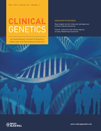
CLINICAL GENETICS
Innovating solutions for genetic challenges.CLINICAL GENETICS is a premier journal in the field of genetics, published by Wiley, and is renowned for advancing the understanding of genetic disorders and their clinical applications. With a notable impact factor and ranking in the top quartile (Q1) in both general genetics and clinical genetics as of 2023, this journal is instrumental for researchers, professionals, and students seeking to explore groundbreaking studies and developments in genetics. Since its inception in 1970, CLINICAL GENETICS has continued to publish high-quality, rigorously peer-reviewed research that pushes the boundaries of knowledge in clinical genetics. The journal maintains a strong reputation in its field, currently holding significant positions in Scopus rankings, including 30th out of 99 in clinical genetics, underscoring its relevance and impact in the field. For those interested, the journal's website provides comprehensive access options for current and archived research, making it an essential resource for anyone involved in genetic research and its clinical application.
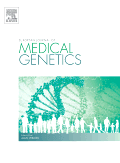
European Journal of Medical Genetics
Transforming Research into Clinical RealitiesEuropean Journal of Medical Genetics, published by Elsevier, is a pivotal platform dedicated to advancing knowledge in the fields of medical genetics and its clinical applications. With an ISSN of 1769-7212 and an E-ISSN of 1878-0849, this journal fosters innovative research and insights into the genetic factors that influence human health. Ranked in the Q3 category for both Genetics and Clinical Genetics, and achieving notable recognition in Medicine (miscellaneous) with a Q2 positioning, it strives to bridge the gap between laboratory findings and clinical practice. Operating in an Open Access format, the journal aims at maximally disseminating essential findings to researchers, professionals, and students alike, ensuring that critical advances in genetics are accessible to the global medical community. With converged publication years spanning from 2005 to 2024, the journal strengthens its mission to be at the forefront of genetic research that informs clinical methodologies and fosters improved healthcare outcomes.
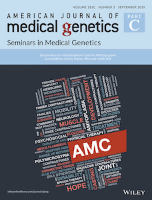
AMERICAN JOURNAL OF MEDICAL GENETICS PART C-SEMINARS IN MEDICAL GENETICS
Fostering Collaboration in the Evolving World of Medical Genetics.AMERICAN JOURNAL OF MEDICAL GENETICS PART C-SEMINARS IN MEDICAL GENETICS is a premier peer-reviewed journal published by Wiley, focusing on the intricate and evolving field of medical genetics. With its ISSN 1552-4868 and E-ISSN 1552-4876, the journal has established itself as a significant resource for researchers, professionals, and students alike, addressing cutting-edge developments in genetic research and clinical practice. Ranked in the top quartile (Q2) in both Genetics and clinical Genetics categories for 2023, it maintains an impressive Scopus ranking, positioning it within the 75th and 71st percentiles for Medicine and Genetics respectively. The journal encourages open access to its content, promoting wider dissemination of knowledge and fostering collaboration among medical genetics experts. From its inaugural issues in 1980 to its ongoing publications, the journal aims to bridge the gap between genetics research and its clinical applications, providing insights that reflect the latest advancements in the field. As it continues to serve the global medical community, the AMERICAN JOURNAL OF MEDICAL GENETICS PART C remains a vital source for those seeking to understand the complexities of genetic disorders and their implications for health and disease.

Frontiers in Genetics
Transforming Genetic Discoveries into SolutionsFrontiers in Genetics is a premier academic journal dedicated to advancing the field of genetics through high-quality, peer-reviewed research. Published by FRONTIERS MEDIA SA in Switzerland since 2010, this Open Access journal provides a platform for researchers and practitioners to disseminate innovative findings across various subfields, including clinical genetics and molecular medicine. With a notable emphasis on interdisciplinary approaches, the journal holds a strong position in the academic landscape, achieving Q2 rankings in key categories such as Genetics and Molecular Medicine in 2023. Not only does Frontiers in Genetics contribute to the scholarly dialogue by publishing impactful studies, but it also promotes accessibility to vital research, ensuring that knowledge is available to a global audience. This journal is a vital resource for researchers, professionals, and students looking to stay at the forefront of genetic discoveries and their applications, reflective of its engagement with contemporary challenges in genetics and healthcare.